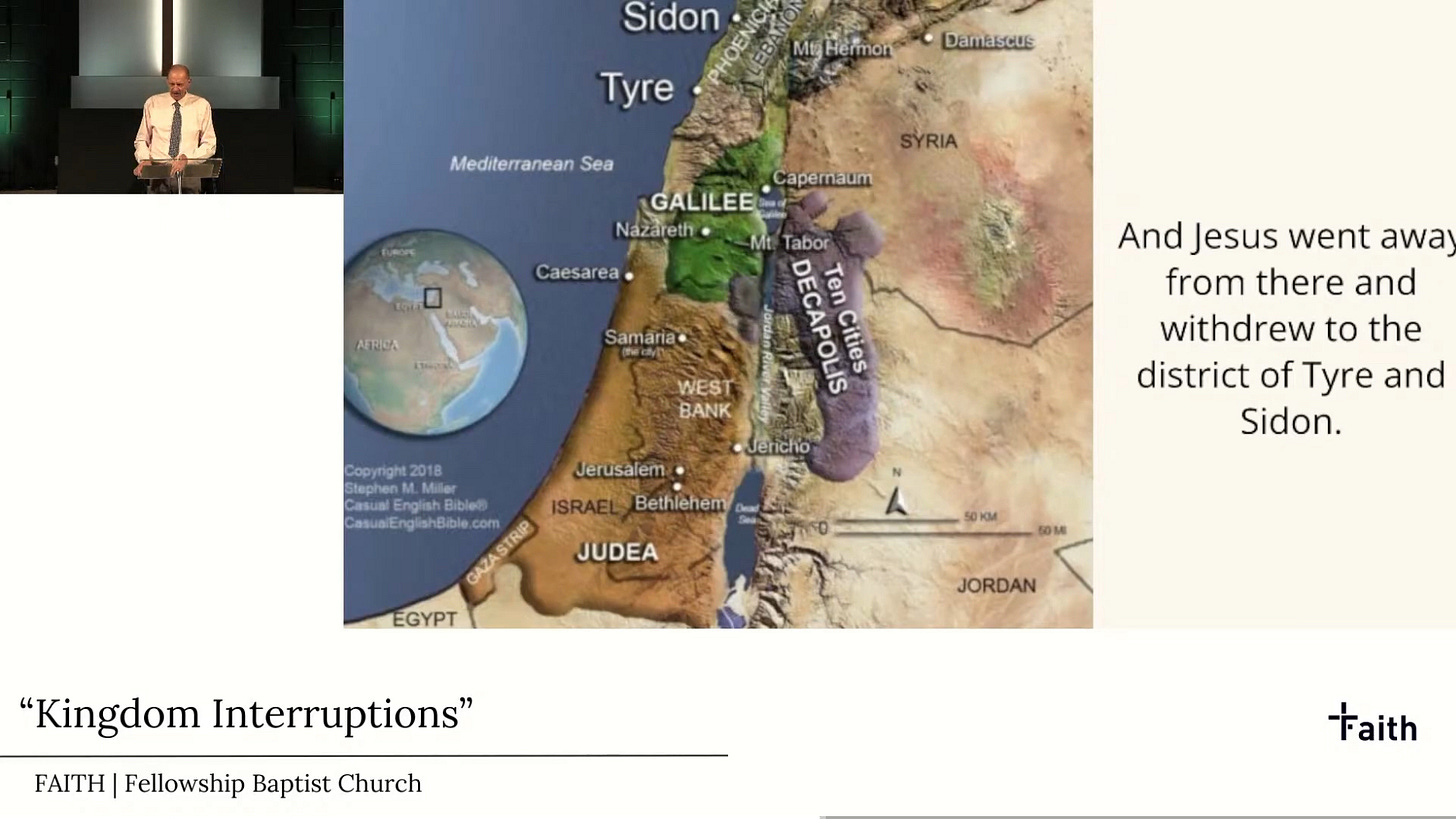Divine Interruptions
week in review for the week ending June 22, 2025
This week Pastor Mark delivered his sermon on Matthew 15:21-28. He called his sermon Kingdom Interruptions, and he spoke about seeing interruptions and distractions and disruptions that happen to us as opportunities to learn something, to see the situation in a different light, to draw closer to g-d, to experience Jesus in the moment.
Matthew 15:21-28 :: The Faith of a Canaanite Woman
21 Leaving that place, Jesus withdrew to the region of Tyre and Sidon. 22 A Canaanite woman from that vicinity came to him, crying out, “Lord, Son of David, have mercy on me! My daughter is demon-possessed and suffering terribly.”
23 Jesus did not answer a word. So his disciples came to him and urged him, “Send her away, for she keeps crying out after us.”
24 He answered, “I was sent only to the lost sheep of Israel.”
25 The woman came and knelt before him. “Lord, help me!” she said.
26 He replied, “It is not right to take the children’s bread and toss it to the dogs.”
27 “Yes it is, Lord,” she said. “Even the dogs eat the crumbs that fall from their master’s table.”
28 Then Jesus said to her, “Woman, you have great faith! Your request is granted.” And her daughter was healed at that moment.
You can watch and listen to the YouTube video Pastor Mark’s sermon above.
Just before this passage we looked at this week, Jesus had told the Pharisees that what goes into the mouth doesn’t defile us, only what comes out of the mouth defiles us. By this he meant the imagination of the unhappy heart, our inclination to evil, Yetzer Hara. As I’ve written previously, the heart serves as the seat of intentionality and all we say, every word that passes through our lips, has its roots in our heart. Right after that encounter Jesus and his disciples went to Tyre and Sidon, two pagan communities in present-day Lebanon. Exhausted from the clamour and throng of the crowds seeking him in Galilee, Jesus sought refuge and rest in Tyre and Sidon. He could also use this opportunity to demonstrate that his ministry extended beyond the House of Israel, and that g-d send Him to be a savior and messiah to gentiles as well as Jews.
A gentile woman, described as Syro-Phoenician or Canaanite, approached Jesus and asked Him to heal her daughter, who was possessed by a devil. Jesus ignored the woman. As He often does throughout the gospel, Jesus used silence as His rhetorical device. The woman persisted, asking the disciples to help her. The disciples grew annoyed, and they asked Jesus to send the woman away. He replied that He was sent for the House of Israel. When the woman persisted, when she worshipped Him and called Him Lord, Jesus told her He couldn’t give the children’s bread to the dogs. The woman persisted still, responding with humility and grace as opposed to offense. She said dogs eat the crumbs that fall from their masters’ table. Jesus, impressed and moved by the gentile woman’s faith, rewarded the woman by healing her daughter.
First of all, let’s talk about Tyre and Sidon. Notorious for their wickedness and idolatry, known as historical enemies of the Israelites, these cities represented the reach of g-d’s grace. Jesus intentionally travelled to these wicked “unclean” places, places known as unfriendly for Jews and for Jesus Himself. Remember last week, when we learned about Jonah being asked to go to the people of Nineveh, and Jonah being upset g-d would extend His grace to the enemies of the Jews? The people of Nineveh repented and g-d spared them, yet, even by the end of the Book of Jonah, the prophet Jonah doesn’t repent. Do you see the contrast, reader? It’s one that carries into the New Testament. Do you see the ongoing contrast in response to The Word from wicked unclean gentiles versus pious righteous Jewish elders and elites?
So, this week we see Jesus has gone to the wicked cities to rest and to do his ministry work. He demonstrates the grace of g-d and He teaches the disciples something. He teaches them a few things. First, Jesus teaches them about g-d’s grace. Second, He’s challenging their xenophobia. When Jesus uses the harsh words with the woman, it is not right to take the children’s bread and toss it to the dogs, He’s not only testing her faith, He’s also testing the disciples; did they pass the test? No, it would seem they did not. When Jesus responds compassionately to the repeated interruptions of the gentile woman, He’s teaching them about faith and about how to use interruptions to draw closer to g-d by serving and comforting others.
Reader, let’s talk about interruptions. The ministry of Jesus entails Jesus experiencing interruptions and attending to the people in need who’ve interrupted Him. Three weeks ago we heard about Jesus going into the wilderness for respite and having a crowd of needy people clamouring for His ministry and care. The week after that we learned about Jesus using the interruptions from the Pharisees to teach a valuable lesson about Yetzer Hara and things that defile humans. We learned that our intentions can defile us. We learned that our words can defile us. Defilement quite often comes from within us, and not from sources external to us. Last week we received a reminder that the prophet Jonah experienced interruptions. Prophets have encountered the most profound and bewildering interruptions, haven’t they, reader?
We celebrated World Refugee Day last Friday. Human displacement—that’s a most profound interruption for a human, isn’t it, reader?
“no one puts their children in a boat unless the water is safer than the land” — Warsan Shire
Reader, what if we could see as Divine invitations the interruptions that present themselves to us like frightening roadblocks and irritating distractions?
“I have always been complaining that my work was constantly interrupted; then I realized that the interruptions were my work.” — Henri J.M. Nouwen, Turn My Mourning into Dancing: Finding Hope in Hard
“Don’t we often look at the many events of our lives as big or small interruptions, interrupting many of our plans, projects, and life schemes? Don’t we feel an inner protest when a student interrupts our reading, bad weather our summer, illness our well-scheduled plans, the death of a dear friend our peaceful state of mind, a cruel war our ideas about the goodness of man, and the many harsh realities of life our good dreams about it? And doesn’t this unending row of interruptions build in our hearts feelings of anger, frustration, and even revenge, so much so that at times we see the real possibilities that growing old can become synonymous with growing bitter?
But what if our interruptions are in fact our opportunities, if they are challenges to an inner response by which growth takes place and through which we come to the fullness of being? What if the events of our history are molding us as a sculptor molds his clay, and if it is only in a careful obedience to these molding hands that we can discover our real vocation and become mature people?
What if all the unexpected interruptions are in fact the invitations to give up old-fashioned and out-moded styles of living and are opening up new unexplored areas of experience? And finally: What if our history does not prove to be a blind impersonal sequence of events over which we have no control, but rather reveals to us a guiding hand pointing to a personal encounter in which all our hopes and aspirations will reach their fulfillment?
Then our life would indeed be a different life because then fate becomes opportunity, wounds a warning and paralysis an invitation to search for deeper sources of vitality. Then we can look for hope in the middle of crying cities, burning hospitals, and desperate parents and children. Then we can cast off the temptation of despair and speak about the fertile tree while witnessing the dying of the seed. Then indeed we can break out of the prison of an anonymous series of events and listen to the God of history who speaks to us in the center of our solitude and respond to His ever new call for conversion.” — Henri Nouwen in Reaching Out: The Three Movements of the Spiritual Life (New York: Doubleday, 1975) 52-53.
As I’ve mentioned, interruptions make up a big part of ministering to and caring for others. Life unfolds itself as a series of interruptions. Reader, what’s the ultimate interruption we all experience? I would argue as an answer, God’s will interrupting our self will. Think of traffic diversions and street construction we encounter in our daily urban lives when trying to get our errands done. Interruptions require us to veer off course, they invite us to take the detour. Detours beckon us to discover the unknown and see the unseen. Interruptions don’t get in the way of real life, they are real life. Interruptions can serve as portals, they can become opportunities. Interruptions mould and shape us. Like a guiding hand, interruptions steer us toward these detours we might not welcome initially, and maybe hate outright.
So, let’s get back to this week’s reading and the three different ways we can respond to an interruption.
Jesus responded to his interruption with compassion and patience and with candour. Like a devoted and loving parental figure, Jesus puts aside what He’s doing in the moment and He listens quietly, and with intentionality He uses the interruption as a teaching moment, to teach about the kingdom of heaven.
The disciples responded to their interruption with dismissive arrogance, impatience, and rejection.
The Syro-Phoenician woman responded to her interruption with grace, humility, and persistence. Rather than disqualify herself, rather than giving up and turning inward towards despair, rather than abandoning her child, or resorting to her cultural norms, which entailed child sacrifice, the woman persists, she has faith and hope for healing in Jesus.
Reader, which way will you decide to respond to your interruptions?
Below the line you can read last week’s missives. In our society some common interruptions we face include terrorism, war, and policy changes. Last week I wrote about these. I’ve also included a link to my column in the New Westminster Times.






